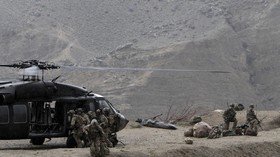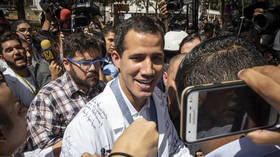Trump cheers troop pullout... Pentagon says pull the other one

President Trump plugged his troop pullout from Syria in the State of the Union address, but he didn’t sound convincing. Meanwhile, the Pentagon and Congress are intensifying the pushback for US military to remain in the region.
In his annual set-piece speech before lawmakers, Donald Trump continued to portray the defeat of the Islamic State terror group in Syria as a uniquely American achievement; just like he sought moments earlier in his opening remarks to triumphantly recount the Second World War as another great liberation by US military.
It seemed more a triumph of PR over substance and historical facts.
On Syria, he said it was “time to give our brave warriors a warm welcome home.” This was a follow-up vow to Trump’s surprise announcement on December 19 when he then ordered the withdrawal of some 2,000 US troops stationed in Syria. However, his Syrian plan sounds suspiciously hollow and non-committal.
Also on rt.com ‘Neo-con wine in an America First bottle’: Foreign policy analysts rail against Trump’s SOTU addressIt was notable that Trump did not give any details or timeframe for the purported drawdown of American forces from Syria. The matter was only briefly touched on in his address, which seems rather strange given that the “defeat of ISIS” is supposed to be a “historic victory” for his presidency.
Elsewhere, US officials are reported as confirming that the pullout from Syria is underway.
But there seems to be little evidence on the ground for the evacuation actually taking place. Indeed, Turkish media are reporting a build-up of US equipment in northeast Syria from across the border in Iraq. Though, that recent contingency could be part of an effort to ensure an eventual safe withdrawal of American personnel from Syria.
For his part, Turkish President Recep Tayyip Erdogan this week expressed growing impatience with the lack of movement by US forces from Syria, an arrangement which he had reportedly worked out with Trump in December before the latter’s pullout announcement was made.
Russia’s President Vladimir Putin has previously cast doubts about the much-vaunted American withdrawal plan from Syria. On Trump’s pullout announcement in December, Putin indicated he wasn’t convinced the plan touted by Trump meant a straightforward removal of US military from the region; a region where tens of thousands of American forces have been present for decades, strewn across several countries, with giant air and naval bases in Kuwait, Iraq, Qatar, and Bahrain.
Ahead of Trump’s address to the nation, the Pentagon and lawmakers within the president’s Republican party appeared to intensify efforts to ensure American military forces remain in Syria.
Only hours before Trump’s speech Tuesday, General Joseph Votel, the top military commander for US forces in the Middle East, told the Senate Armed Forces Committee that ISIS presents an enduring terror threat in Syria and Iraq. He warned, “we have to keep the pressure on this network.” The general was thus raining on the Commander-in-Chief’s rhetorical victory parade.
Also on Tuesday, the Republican-controlled Senate voted by a wide margin for legislation that will block any abrupt withdrawal of US troops from Syria or Afghanistan. Again, the ongoing “security risk” of terrorism was cited. The bill is sure to get approval when it goes next to the Democrat-controlled House of Representatives, partly out of a reflexive desire to snub anything initiated by Trump.
This week also saw a Pentagon internal watchdog report on operations in Syria and Iraq which very much talked up the threat of a resurgence by ISIS following any US troop withdrawal. The report acknowledged Trump’s pullout plan but the brief acknowledgment in the introductory remarks seemed to be lip service. The main thrust of the Pentagon document was a warning of “resurgence by ISIS within six to twelve months” without sustained counter-terrorism by American forces. It also cited objectives, other than defeating terrorists, for US troops remaining in Syria, including, “the removal of weapons of mass destruction [WMD]” and countering “Iranian-backed forces.”
The WMD reference is no doubt to alleged chemical weapons which the US has blamed Syrian government forces for using. Given credible claims this week that US-backed White Helmets terror-affiliated agents have been transporting dangerous chemicals near Khan Shaykhun in Idlib Province, it can be assumed that the WMD pretext for US forces remaining in Syria will be long-lasting.
Also on rt.com US revisits Vietnam Syndrome in Afghanistan after 17 years of war and destructionThe vague reference to “countering Iranian-backed forces” is also another blank check for the Pentagon to find excuses for maintaining a presence in Syria.
In any case, even Trump’s personal view of a military pullout from Syria is not the genuine “homecoming” of American forces one might presume.
Last weekend, the president revealed in a CBS interview that many of the troop numbers purportedly coming out of Syria will be redeployed to American bases in Iraq. He alluded to the huge base at Ayn al Asad in Western Iraq, where he made an unannounced visit in December.
“We spent a fortune on this incredible base [in Iraq], we might as well keep it,” said Trump. He added that US forces in Iraq were “perfectly situated” to keep a “watch on Iran” and the entire region for American interests. In addition, the US military would be staying “to protect Israel.”
Trump’s comments caused a furore in Iraq. Iraqi President Barham Salih said it was “unacceptable” for his country to be used “to keep a watch on Iran.”
Other Iraqi lawmakers denounced Trump’s violation of their sovereignty by unilaterally making plans that exceed the bilateral arrangement with Washington, which is officially for the specific purpose of fighting terrorism.
There are an estimated 5,000 US troops in Iraq, as well as large numbers of private security contractors.
Trump is letting the cat out of the bag. The forces he is apparently planning to pull out of Syria and Afghanistan are not intended to come home. The move is not an overall reduction of the American military in the region. It is more an entrenchment of military power primarily on Iraqi territory. No doubt such a move appeals to Trump’s instincts as a businessman for cost-cutting and rationalizing.
How could we expect it any other way? The permanent military-industrial-congressional complex is too embedded in America’s political economy for any consideration of winding down overseas operations.
The apparent drawdown of US soldiers in one country or another provides a bit of “good news” in the mainstream media of a “victory homecoming.” But the reality is that the same numbers, or more, will be redeployed elsewhere, in this case, Iraq. Or perhaps Venezuela.
Commander-in-Chief Trump may indulge in a rhetorical ticker-tape welcome for “our brave warriors.” The reality is, however, that the Pentagon and bipartisan War Party in Washington are doubling down to make sure there is always a rationale for massive military expenditure and deployment in the Middle East.
American imperialist ambitions, especially in the oil-rich Middle East, are not responsive to a president’s orders. They are a systematic imperative for sustaining US corporate capitalism. For these reasons, American forces are not leaving the Middle East in a supposed end to “endless wars.” US power is addicted to endless wars.
Think your friends would be interested? Share this story!
The statements, views and opinions expressed in this column are solely those of the author and do not necessarily represent those of RT.















